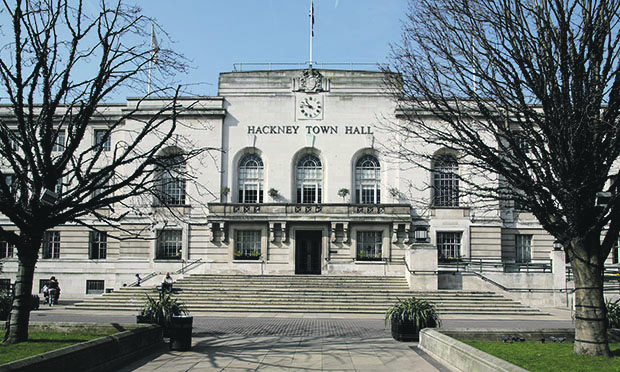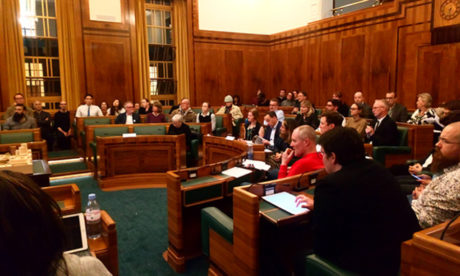Town Hall slams government planning proposals as ‘anti-democratic’

Hackney Council has warned the government that proposals to reform the planning system in its Planning for the Future white paper are, in its view, “anti-democratic”.
The government went out to consultation in the summer on a vision for a new system whereby land would be allocated as ‘growth’, ‘renewal’ or ‘protected’ zones, with new developments favoured in renewal areas, and residential, hospital and school plans automatically allowed in growth zones.
However, in a statement strongly disagreeing with a government proposal under which development management policies would be established on a national scale, the council said that a “significant and highly visible democratic deficit” would result, warning further that a generic set of national policies would be inadequate to deal with local authorities’ differing circumstances.
The council’s response reads: “[Hackney’s Local Plan has] placed local community involvement and engagement at the heart of the process. Hackney Council believes that its approach has helped secure local planning policies that are relevant and deliver growth with consensual support from those most affected.
“The government’s proposals will foreseeably introduce a democratic deficit that will erode all of the council’s good work. It is telling that in spite of the repeated commitments to securing good quality design the proposed change removes from local communities their ability to manage development in
the light of the local knowledge of the building stock, patterns of use and development and local needs.
“The proposal transfers power from local to central government where it will be exercised distantly and without reference to local concerns. The proposal is openly centralising and anti-democratic since it removes from local communities the ability to set planning priorities. Local democratic management of development is deeper and richer than providing a mere design code.”
The council added that it was concerned that the government’s proposals would remove the ability of residents to comment on or object to planning proposals at application stage, with the Town Hall expressing its strong belief that this “fundamental right […] must remain”, saying that removing it would have negative consequences “in terms of local democracy, the rule of law and social cohesion”.
The Town Hall further warned that an emphasis in the proposals on the design quality of genuinely affordable new homes risked creating “bland pattern-book places that discard local character”.
The Planning for the Future paper is founded on the argument that the national system is beyond repair and in need of sweeping reform, with a particular focus on simplifying the system, which the government argues would speed up the delivery of new homes.
In a letter to housing secretary Robert Jenrick, Hackney Mayor Philip Glanville argued that 90 per cent of major and 80 per cent of minor applications are determined on time in the borough, pointing instead to the fact that a quarter of residential planning permissions granted since 2012 went unbuilt by developers.
The borough leader went on to underline the importance of any new system delivering over 30 per cent affordable housing, with a prioritisation on genuinely affordable social rent and intermediate homes, slamming the government’s subsidised First Home proposals as “in no way genuinely affordable and a reheat of the discredited Starter Homes programme”.
Echoing the borough leader and the council’s own strong concerns over a democratic deficit, planning committee chair Cllr Vincent Stops said in a message to the government: “Your proposals will effectively remove the need for a local planning committee.
“You will effectively remove the ability for the views and opinions of local residents, businesses, developers and landowners to be aired publicly. I would like to ask you – who will be accountable when your new system goes wrong?
“Will you stand before those residents, businesses, developers and landowners and take responsibility? We are confident with the effectiveness of our current planning system and I know that it can deliver the good quality places and growth that your Government is keen to see whilst ensuring that this growth is planned and meets the needs of a growing community. Your proposals do not support sustainable and inclusive growth.”

Glanville added that under the proposals there would “undeniably” be fewer opportunities for residents to engage in plans for their own communities with the shaping of policy less transparent, with the council’s own corporate response claiming that the existing approach allows decisions to be made flexibly with the ability for the system to adapt to changes in the market and society.
However, Hackney Society chair Nick Perry has pointed out that the Town Hall administration’s criticism of the plans’ potential to dilute democratic accountability appear to accept the premise that public participation both is and should be strongest at the plan and policy-making level.
The society chair went on to argue that in fact few people have the expertise or time to engage at the level described by the councillors in their response, and that the system “even then involves a process of modification that frequently introduces nuance and flexibility that neutralises protection for community concerns”.
Perry pointed to the current possibility within the system for community concerns to be “dodged” at the point when individual schemes, which draw the most attention, are actually being decided on, going on to argue that the existing “gaping deficit” between the power of developers and the involvement of the community needed to be recognised ahead of talk of sweeping reforms.
He said: “It is hard to disagree with the criticisms which the Mayor and Cllr Stops level at the White Paper, particularly with regards to the control of affordable house supply – a sure fire way to protect high home and land prices rather than deflate the market.
“[Cllr Stops] lauds his own committee’s success in a pro-development borough, implementing a flexible and accountable planning regime. But you’d be hard pushed to find many members of the public who have participated in individual planning decisions, who haven’t heard committee members and officers sweep away their concerns on the basis that ‘policy doesn’t allow for them’.
“If the council has any serious intent in its oft-heard ‘Oh it’s nasty Tory policy’ rhetoric, deployed in defence of its own impotence against developers, then it should be using this consultation to recognise the system’s current inadequacies, not just lauding itself at being superlative at playing the game.”
In a statement, Mayor Glanville said: “We are in an unprecedented housing crisis, with 13,000 families in Hackney on the housing waiting list, 3000 of them in temporary accommodation and the proposals brought forward by the Government does little to address this large demand nor provide us with the funding or infrastructure to help deliver the homes so desperately needed in our borough.
“I helped to successfully lead the local opposition to previous attempts to impose detrimental planning reforms on Hackney in 2016 when similar ideas were last proposed. They were wrong then and they are wrong now. Reheating Starter Homes won’t help us deliver the genuinely affordable housing we need, nor help us ‘build back better’. After ten years and countless housing ministers, we have a government still blaming the planning system for their own failure to invest in the genuinely affordable homes our country needs.
“The government needs to work with ─ and not undermine ─ local authorities and provide us with the tools to deliver genuinely affordable new homes. If the government fails to heed the chorus of voices from across business and local government condemning their latest planning proposals, they will be responsible for leaving an unpleasant legacy for our future generations and will have failed in levelling up our country.”
You can view the government’s planning white paper here.
You can view the council’s response to the consultation here.
